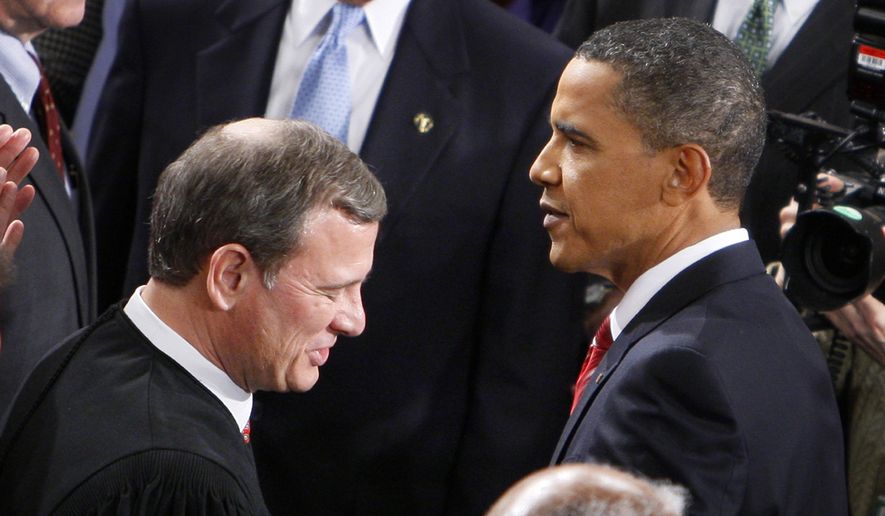Chief Justice John G. Roberts Jr. has saved Obamacare for a second time, writing the majority opinion Thursday that upheld the health care law’s key provision of paying tax subsidies to customers in all states and saying the law otherwise would be a mess — something he doubted Congress intended.
The ruling reverberated immediately on Capitol Hill, but legal analysts said it has implications far beyond the Affordable Care Act because it opens an avenue for judges to substitute their own judgments for the intentions of Congress.
Democrats, who have repeatedly blasted the chief justice for his rulings, defended him Thursday by saying he restored Americans’ faith in the court’s ability to reach nonpartisan conclusions.
Critics — including, apparently, Justice Antonin Scalia, the court’s senior jurist — said Chief Justice Roberts’ decision made a mockery of legal reasoning.
One conservative legal observer said the chief justice has gone from being a fair-minded umpire calling balls and strikes to being a pinch hitter in favor of Obamacare.
Justice Scalia said his colleague engaged in “interpretive jiggery-pokery” and “somersaults of statutory interpretation” to find a way to defend the law.
SEE ALSO: Obama wins: Supreme Court upholds Obamacare subsidies, 6-3
“We should start calling this law SCOTUScare,” Justice Scalia wrote in a dissent joined by Justices Clarence Thomas and Samuel A. Alito Jr. “The cases will publish forever the discouraging truth that the Supreme Court of the United States favors some laws over others, and is prepared to do whatever it takes to uphold and assist its favorite.”
Josh Blackman, an associate professor at the South Texas College of Law and author of a book on constitutional challenges to the federal health care act, said Obamacare, under the chief justice’s interpretation, has become bigger than the law itself.
“Once you start with the premise that the goal of a judge is to enforce some nebulous purpose of the law, everything can be done and the law can always be saved,” he said.
At issue is a part of the law that says subsidies should be paid to customers of exchanges “established by the state.”
Critics said that would exclude the 34 states that refused to establish exchanges and relied instead on the federal HealthCare.gov portal. But the chief justice, writing in the 6-3 ruling, said even residents of states that don’t establish exchanges and rely instead on the federal marketplace can receive subsidies.
He said the intent of lawmakers couldn’t have been to pick and choose because that would destroy the fundamental economics of Obamacare, which couldn’t have been the intention of those who wrote the law.
SEE ALSO: Boehner: Undecided on whether to repeal Obamacare with budget tool
“The combination of no tax credits and an ineffective coverage requirement could well push a state’s individual insurance market into a death spiral,” Chief Justice Roberts wrote.
Democrats praised the chief justice and quoted extensively from his opinion.
“I commend Justice Roberts for restoring the people’s faith in the Supreme Court as a nonpartisan institution,” said Rep. John B. Larson, Connecticut Democrat. “This ruling puts politics aside in favor of the health and well-being of the American people — exactly as the Supreme Court is meant to do.”
It was the second time the chief justice has ridden to the rescue of Obamacare. In 2012, he ruled that despite the Obama administration’s insistence to the contrary, the law was based on a tax and therefore was constitutional under congressional taxing powers.
Democrats widely accused the George W. Bush nominee of taking the court in a direction that was too conservative. Chief Justice Roberts’ Obamacare rulings, however, have dented that narrative.
The New York Times this month ran an article arguing that this year’s court term, which concludes at the end of the month, has lurched back to the left.
Some court watchers speculated that the chief justice even reversed himself at the last minute in 2012 to support Obamacare, earning enmity from the law’s opponents. Some justices rejected the tax argument during oral arguments before reversing themselves and embracing it in their final opinion.
Carrie Severino, chief counsel to the Judicial Crisis Network, which pushes for conservative judges, said the chief justice has created a grim legacy that contradicts his vow during his 2005 confirmation hearings to be as impartial as a baseball umpire calling balls and strikes.
“If the chief justice is willing to join the court’s liberals in this linguistic farce, it’s time we admitted that our national ’umpire’ is now playing for one of the teams,” she said in a statement.
• Stephen Dinan can be reached at sdinan@washingtontimes.com.




Please read our comment policy before commenting.